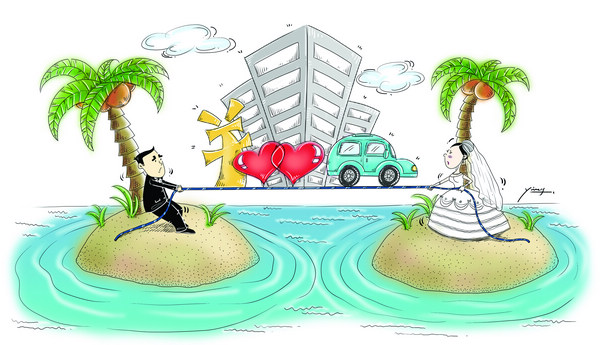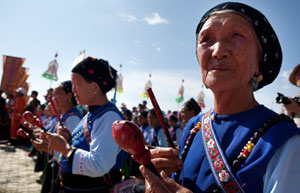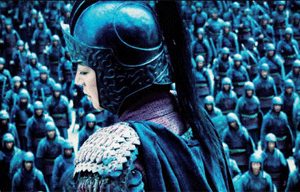Marriages need cash and love
Updated: 2011-10-18 08:33
By Jiang Xueqing (China Daily)
|
|||||||||
|
 |
Sometimes he runs over budget after inviting his colleagues to a fairly expensive dinner. When this happens he takes money from home and tells his wife so that her bookkeeping is up to date.
Hu said that her husband is not good at taking care of money. Before they got married he had no savings, despite having worked for more than six years. Even worse, he had absolutely no idea where his money had gone.
"So I took his bank card," said Hu, a 28-year-old editor at a daily newspaper in Beijing.
She keeps a very clear and detailed record of how they spend their money, even expenses as tiny as 0.5 yuan. The couple makes 500,000 yuan a year and spends about 110,000 yuan, not including mortgage payments, which amount to 90,000 yuan a year.
"Money is very important to a marriage," Hu said, and one's life quality should not go down steeply after getting married.
"I remember the popular Hong Kong writer Yi Shu once wrote in her novel, 'I want a lot of love. If there is no love, I want a lot of money.' At least I should have either of them."
Love and money: Which is more important to a marriage?
Property off-limits
Some experts said the latest interpretation of the Marriage Law is an attempt to encourage people to marry for love rather than money by restricting treasure hunters' access to others' fortune through marriage.
The interpretation by the Supreme Court, which came into force on Aug 13, made it clear that a home purchased before marriage is the personal property of the person who bought it. In case of divorce, the registered owner must compensate his or her partner for mortgage payments and any increased value in the property.
If the parents of the husband or wife buy a house for their child and the property ownership certificate is registered solely to the child, the house will belong to the child in the event of a divorce.
In the past 10 years, housing prices have skyrocketed in cities. In Beijing, the average price of a typical apartment reached 23,730 yuan a square meter at the end of August, according to statistics from the Beijing Real Estate Transaction Management Network. To the majority of Chinese families, homes have become their most valuable properties.
Some people said the new Marriage Law interpretation will encourage people to care more about affection than property. Others believe that despite its good intentions, the legal interpretation cannot force people to upgrade their moral standards, regardless of the social reality.
"Marriage is not simply about love," said Jiang Yue, a professor in Xiamen University's law school and an expert in marriage law. "It is a process of living. Can you talk about love all day but have no place to sleep?
"Actually, we cannot make a clear separation of affection and material goods," she continued. "Otherwise, why would nobody fall in love with a homeless person who lives under an overpass?"
The modern cave
A survey of more than 100,000 single Chinese in 2009 found that for women, personal income ranked third among the top criteria in choosing a spouse, while physical appearance ranked third for men. Both men and women chose morality and personality as their top concerns, said Mu Yan, co-founder and vice-president of Baihe.com, one of the leading Chinese Internet dating and matchmaking sites.
Another survey by Baihe, conducted last year among 32,676 people ages 20 to 60, found that about 71 percent of women consider possession of a house a prerequisite for a man to get married, while only 48 percent of men have the same point of view. Nearly 86 percent of the people surveyed selected "having a stable income" as a precondition to tying the knot, followed by "having a house" (58 percent) and "having a certain amount of savings" (54 percent).
In general, the situation today is not much different from 5,000 years ago, Mu said. "In primitive communes, women must live in caves to bear children, so the men who are capable of occupying caves will find wives.
"In today's society, housing prices are rising fast... . As the general public and women in particular are feeling more and more insecure, their demands for housing and financial security will keep growing."
 |
|
 |










